新目标九年级英语unit4导学案
人教版新目标九年级英语Unit4教案

Unit 4 What would you do?Part 1: Teaching design (第一部分:教学设计)Structures: Second conditional, Should for adviceTarget language:What would you do if you won a million dollars?I’d give it to medical research.I can’t sleep the night before an exam. Wha t should I do?If I were you, I’d take a long walk before going to bed.Vocabulary: million, charity, pimple, confident, shirt, tie, medical researchLearning strategies: Matching, Listening for key wordsSECTION AGoals●To learn to use Second conditional and Should for advice●To listen and talk about imagined lifeProceduresWarming up by learning about Second conditional and Should for adviceThe second conditional (also called conditional type 2) is a structure used for talking about unreal situations in the present or in the future. This page will explain how the second conditional is formed, and when to use it.The structure of a second conditional sentenceLike a first conditional, a second conditional sentence consists of two clauses, an "if" clause and a main clause:If I had a million dollars, I would buy a big house.If the "if" clause comes first, a comma is usually used. If the "if" clause comes second, there is no need for a comma:I would buy a big house if I had a million dollars.We use different verb forms in each part of a second conditional:if + subject + simple past verb*subject + would + verb1a Talking about imaginary situations1b Listening and numberingNow you are going to listen and number the pictures 1 to 3 in the order you hear them.Now listen again and write down the sentences with Second conditional and Should for advice1c Doing pairworkLet’s pretend that we are the people in the picture on page 26. Talk with your partner about what you would do if you had a million dollars.Look. This old man had a million dollars, and he gave it to charity.Wow! What would a million dollars?I’d give it to medical research.I’d take a chance to achieve my dream of flying to the moon.a million dollars, I’d stop working and become a professional runner.I’d go to an old people’s home to help them.I’d volunteer at the hospital twice every week.2a Listening and circlingListen to the tape and circle the reasons in the box on page 27 why Larry is nervous.2b Listening and checkingListen to the tape again and check on page 27 the four things Larry’s sister says to him.2c Doing pairworkXu Linfeng, you are Larry. Men Yati ng, you are Larry’s sister. Xu is going to talk about his worries and Men is going to give him advice.X: I don’t know what to wear.M: If I were you, I’d wear a shirt and tie.X: I don’t have a present. What if everyone elseM: If I we re you, I’d take a small present—a pen or something. brings a present?X: What if I don’t know anyone?M: If you don’t know anyone, you can talk to Tom. He’llintroduce you to people.……3a Reading and matchingGo to page 28. Read the problems in the boxes and match them with the correct advice.And now write down all the expressions into your phrase book.be really shy, enjoy parties, get nervous before big parties, get pimples, look terrible, the night before…, take a big exam, do well, help with…, eat lots of fruits, drink lots of water, take a long walk, go to bed, look friendly, feel shy3b Thinking and role playingNext you are going to think of different advice for the problems in activity 3a. Role play conversations with your partner.A:I am really shy. I don’t enjoy parties.B:If I were you, I’d go and shout in the street. I’d set up parties and invite all my classmates to come and sing and dance.A: I get nervous before big parties and I get pimples.B: Pimples look good to me. They are not terrible at all. I f I were you, the night before the big exam I’d lie in bed counting the cows, the sheep, the cattle and the horses. Then I’d have a nice sleep. If you count as many cows as possible you’d do well in the exam.A:I can’t lose my weight.B: If I were you, I’d eat lots of fruits, drink lots of water and take a long walk before going to bed every evening.4. Doing group workClosing down by taking a test on Second conditionalMatch up the parts of the sentence1. If I lost my job,A we'd both benefit.B I'd have a lot of problems getting another one.C you'd be more aware of what people really felt.D we wouldn't be so behind technologically.2. If I were in your position,A I'd resign rather than wait to be sacked.B I'd have a lot of problems getting another one.C you'd be more aware of what people really felt.D we wouldn't be so behind technologically.3. If I spoke Japanese as well as you do,A I'd resign rather than wait to be sacked.B I'd try to find a job with one of the Japanese banks.C we'd both benefit.D we wouldn't be so behind technologically.4. If we spent more on Research and Development,A I'd resign rather than wait to be sacked.B I'd have a lot of problems getting another one.C I'd try to find a job with one of the Japanese banks.D we wouldn't be so behind technologically.5. If you spoke less and listened more,A I'd resign rather than wait to be sacked.B I'd have a lot of problems getting another one.C I'd try to find a job with one of the Japanese banks.D you'd be more aware of what people really felt.6. If you spent more time on your own problems and a bit less on mine,A I'd resign rather than wait to be sacked.B I'd have a lot of problems getting another one.C we'd both benefit.D I'd try to find a job with one of the Japanese banks.7. If we controlled our expenses a bit better,A I'd resign rather than wait to be sacked.B I'd have a lot of problems getting another one.C we'd save a lot of money.D I'd try to find a job with one of the Japanese banks.8. If you invested some time into learning how the Internet works,A you'd find that it could really help you in your job.B I'd have a lot of problems getting another one.C we wouldn't be so behind technologically.D I'd try to find a job with one of the Japanese banks.9. If we opened an office in Tokyo,A we wouldn't be so behind technologically.B you'd be more aware of what people really felt.C I'd be interested in working there.D we'd both benefit.10. If you didn't take the job,A you'd regret it later.B you'd be more aware of what people really felt.C we wouldn't be so behind technologically.D I'd try to find a job with one of the Japanese banks. SECTION BGoals●To find out about people’s personalities●To learn to communicate by Second conditional and Should for adviceProceduresWarming up by learning about personalityWhat is personality? What is your personality?In psychology, personality describes the character of emotion, thought, and behavior patterns unique to a person. There are several theoretical perspectives on personality in psychology, which involve different ideas about the relationship between personality and other psychological constructs, as well as different theories about the way personality develops.1a Describing and fillingTurn to page 29 and fill in the blanks with words given.1b Which words in activity 1a describe you? Tell your partner.What are you like? I think I am creative and outgoing.2a Listening and checkingCella is asking Bill questions from a personality survey. Check the questions Cella asks.2b Listening and circling2c Doing pairworkIn pairs ask and answer the questions in the personality survey on page 29.3a Reading and fillingLook at the survey in 2a and read the personality survey result below on page 30. Fill in the balnks with a, b or c.3b Looking and writingNext you are to write your own personality survey based on the that in 2a.4 Doing groupworkAsk students in your group the questions from your survey. Discuss the results.Closing down by taking a personality surveyRead each statement carefully, and choose one answer from “Strongly Agree”, “Agree”, “Disagree”, “ Strongly1.Filling the blanksOn page 31 is a box with sentences in black. Read them and fill in the blanks with a correct word given. Make changes to the form if necessary.2.Reading an e-mailRead the e-mail from Fran and copy all the expressions.Just for funTo end this period let’s do something fun—to find the animals.Reading: What would you do if …?Before you read, go to page 148 to learn the words for this reading passage first.While you read, put the sentences into thought groups and underline all the useful phrases to be copied later after class.。
部编RJ人教版PEP新目标 初三九年级英语 上册第一学期秋季(优质导学案)Unit 4 导学案
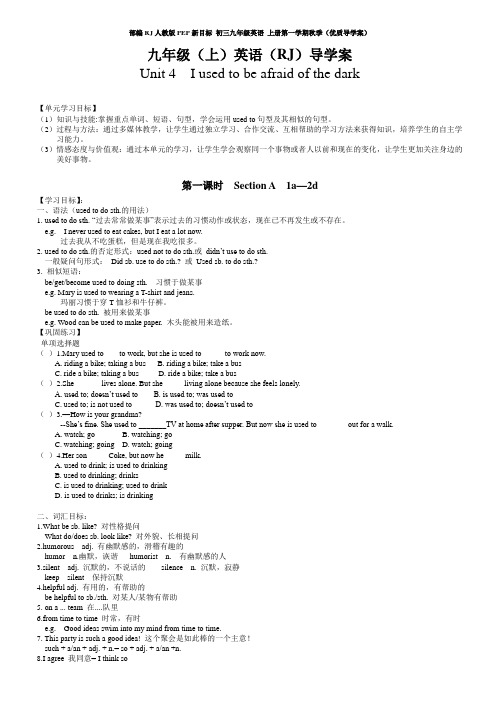
九年级(上)英语(RJ)导学案Unit 4 I used to be afraid of the dark【单元学习目标】(1)知识与技能:掌握重点单词、短语、句型,学会运用used to句型及其相似的句型。
(2)过程与方法:通过多媒体教学,让学生通过独立学习、合作交流、互相帮助的学习方法来获得知识,培养学生的自主学习能力。
(3)情感态度与价值观:通过本单元的学习,让学生学会观察同一个事物或者人以前和现在的变化,让学生更加关注身边的美好事物。
第一课时Section A 1a—2d【学习目标】:一、语法(used to do sth.的用法)1. used to do sth. “过去常常做某事”表示过去的习惯动作或状态,现在已不再发生或不存在。
e.g. I never used to eat cakes, but I eat a lot now.过去我从不吃蛋糕,但是现在我吃很多。
2. used to do sth.的否定形式:used not to do sth.或didn’t use to do sth.一般疑问句形式:Did sb. use to do sth.? 或Used sb. to do sth.?3. 相似短语:be/get/become used to doing sth. 习惯于做某事e.g. Mary is used to wearing a T-shirt and jeans.玛丽习惯于穿T恤衫和牛仔裤。
be used to do sth. 被用来做某事e.g. Wood can be used to make paper. 木头能被用来造纸。
【巩固练习】单项选择题()1.Mary used to ___ to work, but she is used to _____ to work now.A. riding a bike; taking a busB. riding a bike; take a busC. ride a bike; taking a busD. ride a bike; take a bus()2.She ______ lives alone. But she_____ living alone because she feels lonely.A. used to; doesn’t used toB. is used to; was used toC. used to; is not used toD. was used to; doesn’t used to()3.—How is your grandma?--She’s fine. She used to _______TV at home after supper. But now she is used to _______ out for a walk.A. watch; goB. watching; goC. watching; goingD. watch; going()4.Her son _____Coke, but now he _____milk.A. used to drink; is used to drinkingB. used to drinking; drinksC. is used to drinking; used to drinkD. is used to drinks; is drinking二、词汇目标:1.What be sb. like? 对性格提问What do/does sb. look like? 对外貌、长相提问2.humorous adj. 有幽默感的,滑稽有趣的humor n.幽默,诙谐humorist n. 有幽默感的人3.silent adj. 沉默的,不说话的silence n. 沉默,寂静keep silent 保持沉默4.helpful adj. 有用的,有帮助的be helpful to sb./sth. 对某人/某物有帮助5. on a ... team 在....队里6.from time to time 时常,有时e.g. Good ideas swim into my mind from time to time.7. This party is such a good idea! 这个聚会是如此棒的一个主意!such + a/an + adj. + n.= so + adj. + a/an +n.8.I agree 我同意= I think so表示不同意时用I don’t agree 或I disagree9.It’s been three years since we last saw our primary school classmates.自从我们上次小学同学见面以来已经有三年的时间了。
人教新目标英语九年级Unit4 复习学案(含答案)
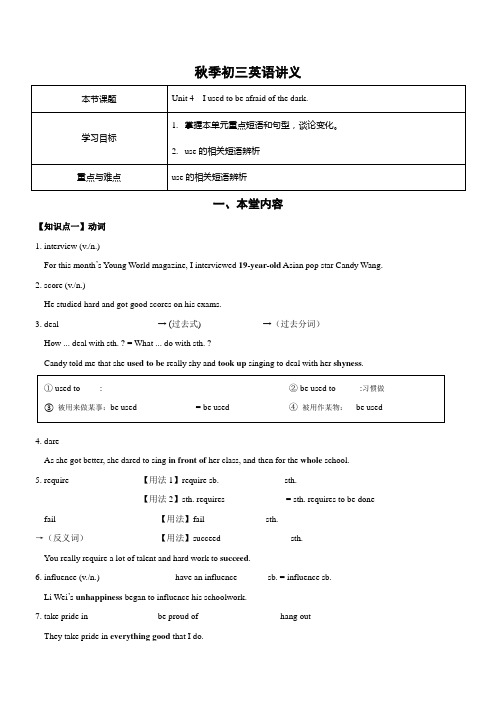
秋季初三英语讲义一、本堂内容【知识点一】动词1. interview (v./n.)_______________For this month’s Young World magazine, I interviewed 19-year-old Asian pop star Candy Wang.2. score (v./n.) _____________He studied hard and got good scores on his exams.3. deal _______________ → (过去式) ___________ →(过去分词)________How ... deal with sth. ? = What ... do with sth. ?_____________Candy told me that she used to be really shy and took up singing to deal with her shyness.① used to ____:__________________ ② be used to _____:习惯做③被用来做某事:be used ___________ = be used ___________ ④被用作某物:be used ___________4. dare ______________As she got better, she dared to sing in front of her class, and then for the whole school.5. require _____________ 【用法1】require sb. ______________ sth.【用法2】sth. requires _____________ = sth. requires to be donefail ______________ 【用法】fail _____________ sth.→(反义词)_____________ 【用法】succeed _______________ sth.You really require a lot of talent and hard work to succeed.6. influence (v./n.) _____________ have an influence ______ sb. = influence sb.Li Wei’s unhappiness began to influence his schoolwork.7. take pride in _____________ be proud of _____________ hang out _____________They take pride in everything good that I do.8. in person _____________ in public _____________ from time to time _____________【课堂练习】用所给词的适当形式填空,每词限用一次。
九年级英语上册 Unit 4 I used to be afraid of the dark Section B (1a-1e)导学案
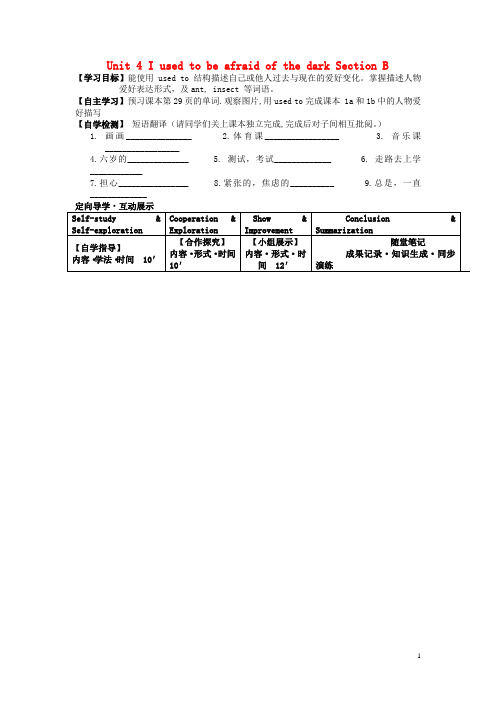
Unit 4 I used to be afraid of the dark Section B【学习目标】能使用used to 结构描述自己或他人过去与现在的爱好变化。
掌握描述人物爱好表达形式,及ant, insect 等词语。
【自主学习】预习课本第29页的单词.观察图片,用used to完成课本 1a和1b中的人物爱好描写【自学检测】短语翻译(请同学们关上课本独立完成,完成后对子间相互批阅。
)1.画画_______________2.体育课_________________3. 音乐课_________________4.六岁的______________5. 测试,考试_____________6. 走路去上学____________7.担心________________ 8.紧张的,焦虑的__________ 9.总是,一直_____________m调跟读并自主核对答至【当堂检测反馈】(3’)根据汉语提示填空完成句子,每空一词 (关上书本,独立完成。
做完后对子间相互批阅。
)1. 我习惯收集蚂蚁和其他昆虫。
I used to collect ______ _____ _____ .2. 我的语文老师过去憎恨体育课。
My Chinese teacher ______ ______ ______ P..E class.3. 他过去常常走路去上学。
He used to ________ ________ _______?4. 李先生过去住在美国,所以习惯吃西餐。
Mr Li ____ _____ ____ in America, so he _____ _____ ______ _______ western dishes.5.过去的日子老板总是要求他的工人工作。
The boss made his boys work _______ _______ _______ in the old days.【拓展提升】1.时间: 10’ 2.训练方式:独立,自主完成自评:师评:批阅日期:___________一、基础题: 用所给词的适当形式填空:1. She used __________(have)straight hair.2.Our teacher looks so _________(worry),What happened?3.I used to be afraid of ___________(speak)in front of a group .4. I have been used to ____________ (live)here.5. His mother makes ____________ (wash)his feet before going to bed.二、发展题:单项选择。
人教版新目标九年级英语Unit4单元教案
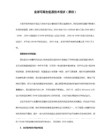
知识与能力 1) 学习掌握下列词汇: background, interview, Asian, deal with, dare, private, guard, require 2) 阅读短文,能按要求获取相关的信息。
通过阅读训练来提高学生们的阅读能力。 4) 学习运用used to来表达“过去常常”存在的状态或的发生的
总第 课时
态度与价值
让学生明白事物是在不断发展、变化的道理,培养学生积极向上的心态。
1) 掌握本部分出现的生词和词组,达到熟练运用的目标。
阅读短文,获得相关的信息。通过阅读练习,来提高阅读能力。
1) 阅读短文,获得相关的信息的能力。
理解并运用所学的词汇及表达方式。
修改补充
她总是不够勇敢去问问题。
___________________________________
Mario used to be short and wear glasses.
What’s he like now?
的否定形式有两种:didn’t use to或usedn’t to。
用于疑问句时,可借助助动词did,也可以将used提到主语前。
河东中学英语组集体备课模板
九年级 课题 Unit 4 I used to be afraid of
组别 英语组
孙仲奎 参备教师 郑海虹 课时
看一下 take a walk 散步take away 带走,拿走,取走
照顾;注意;抚养take charge 掌管,负责
deal v. 对待;处理 (dealt, dealt) deal with 应对;处理
这些信件你处理了吗?shyness n. 害羞
人教版最新版九年级英语导学案—Unit-4-I-used-to-be-afraid-of-the-dark
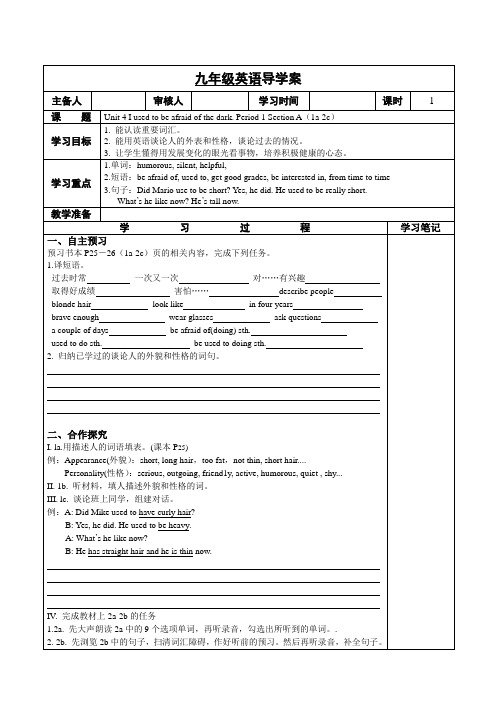
九年级英语导学案主备人审核人学习时间课时 1 课题Unit 4 I used to be afraid of the dark. Period 1 Section A(1a-2c)学习目标1. 能认读重要词汇。
2. 能用英语谈论人的外表和性格,谈论过去的情况。
3. 让学生懂得用发展变化的眼光看事物,培养积极健康的心态。
学习重点1.单词:humorous, silent, helpful,2.短语:be afraid of, used to, get good grades, be interested in, from time to time3.句子:Did Mario use to be short? Yes, he did. He used to be really short.What’s he like now? He’s tall now.教学准备学习过程学习笔记一、自主预习预习书本P25-26(1a-2c)页的相关内容,完成下列任务。
1.译短语。
过去时常一次又一次对……有兴趣取得好成绩害怕……describe peopleblonde hair look like in four yearsbrave enough wear glasses ask questionsa couple of days be afraid of(doing) sth.used to do sth. be used to doing sth.2. 归纳已学过的谈论人的外貌和性格的词句。
二、合作探究I. la.用描述人的词语填表。
(课本P25)例:Appearance(外貌):short, long hair,too fat,not thin, short hair....Personality(性格):serious, outgoing, friend1y, active, humorous, quiet , shy...II. 1b. 听材料,填人描述外貌和性格的词。
人教新目标九年级英语全一册Unit4period4教学设计
3.引导学生深入理解文章内容,提高阅读理解能力,尤其是对文章主旨和细节的把握。
4.教会学生将理论知识与实际生活相结合,培养他们的环保行为和习惯。
(三)教学设想
1.创设情境,激发兴趣:通过展示现实生活中的环保案例,引起学生对环保话题的关注,激发他们的学习兴趣。
7.口语练习:与同学进行角色扮演,模拟一次环保主题的演讲或辩论,提高口语表达能力。
作业要求:
1.学生按时完成作业,确保作业质量。
2.家长协助监督,关注学生的作业进度。
3.教师在下次课堂上对作业进行反馈,指导学生改进。
6.反馈评价,促进成长:通过课堂提问、作业批改等方式,了解学生的学习情况,及时给予反馈,帮助学生不断进步。
在教学过程中,教师应关注学生的个体差异,灵活运用多种教学方法,注重培养学生的语言能力、思维品质和学习策略。同时,教师还要关注学生的情感态度和价值观,引导他们形成正确的环保观念,为构建和谐生态环境贡献力量。
3.每个小组汇报讨论成果,其他小组给予评价和建议。
(四)课堂练习
1.教师设计不同类型的练习题,包括词汇填空、句型转换、阅读理解和写作等,以检验学生对课堂所学知识的掌握程度。
2.学生独立完成练习题,教师巡回指导,针对学生的疑问进行解答。
3.教师选取部分练习题进行讲解,强调解题技巧和易错点。
(五)总结归纳
4.培养学生对英语学科的兴趣和热情,激发学生持续学习的动力。
5.培养学生的国际视野,使其了解全球环境问题,关注世界各地的环保举措。
二、学情分析
九年级的学生已经具备了一定的英语基础,掌握了基本的词汇、语法和句型。在此基础上,他们对环保话题有所了解,但可能对环境保护的具体措施和全球环境问题的严重性认识不足。因此,在本节课中,教师应关注以下学情:
九年级上册英语unit4全单元导学案
重点
熟记重点单词短语
难点
进一步掌握used to并运用
学习过程
学(教)记录
一、课前预习。(教师寄语:预习感知,有备无患)
要点助学(预习本课内容,在课本上划出下列句子,并翻译)
①alone独自一人的, lonely孤独的,寂寞的能从意思上看出两单词的区别吗?
This little boy lived in this house ______, but he didn’t feel_____.
三、课堂活动(教师寄语:展示自我,合作提高)
1检查课前预习,各小组展示讨论并探索存在的问题。2.朗读单词,完成1a
3两人一组谈论过去的外表、性格等及与现在的不同。例如:I used to be short, but now I am tall. (用quiet ,shy/outgoing, have straight hair/have curly hair等谈论P10(1a) )。
4. Where ___________ live before you came here?
A. did you used to B. did you use to C. use he to D. he used to
5.My sister used to have long hair,?
A. used she B. didn’t she C. have she? D. did she
①I used to be afraid of the dark .
used to do sth.过去常常做某事。用于过去式中,表示现在已不存在的习惯或状态。查阅资料,掌握used to的用法。
(1) He____ __________after school.放学后他过去常常踢足球。
【K12学习】XX年新版人教版九年级英语上册Unit4单元导学案
XX年新版人教版九年级英语上册Unit4单元导学案刘营初中九年级英语五步案执笔龚琴审核初三英语组课型听说课课时1授课人授课时间姓名学案编号No.1【课题】Unit4Iusedtobeafraidofthedar.SectionA1a-1c教师复备栏或学生笔记栏【学习目标】1熟练运用usedtodosth谈论自己、他人过去的习惯、爱好、形象及经常做的事情。
2能够听懂有关学习方法的简短对话。
3能运用usedto来谈论过去。
【学习重点难点】1熟记重点单词短语。
2正确使用usedto【学法指导】谈论自己和同学的变化----听读感受别人的变化---巩固练习【教学过程】【教学过程】一、导入usedto的用法“usedto+动词原形”表示过去常常干某事,现在不在干了。
只有一种形式,即过去式。
例如:Iusedtogotoorbybus.NoItaeataxi.Sothesentence“Iusedtobeafraidofthedar.”eansinchinese:我过去常害怕黑暗。
“usedto”的疑问形式和否定形式:—Didyouusetobeafraidofthedar?—yes,Iusedtobeafraidofthedar.—Didheusetobeafraidofthedar?—No,hedidnotusetobeafraidofthedar._Thereusedtobeachurchhere,didn‘tthere?跟踪练习He________________afterschool.放学后他过去常常踢足球。
He_________________________________.他过去不吸烟。
Heusedtoplayfootball.___________________________________________________ ____朗读,体会usedto的用法Bob:o,ario,youloodifferent!youusedtobeshort,didn’tyou?ario:yes,Idid.NoI’tall.Andsoareyou!Bob:That’strue.Andyouusedtoearglasses.Ay:Hi,Bob.Hoareyou?Bob:Fine.o,you’vechanged!Ay:Really?Ho?Bob:youusedtohaveshorthair.Ay:youreeberthat?yes,Idid.二、自学朗读、翻译短语Ihaven’tseenyouforfouryears!acoupleofdays.NoI’tall.Andsoareyou!youusedtoearglasses.you’vechanged!youusedtohaveshorthair.youusedtobereallytall!Notanyore.itusedtobered,didn’tit?itusedtobecurly.youusedtobeshort,didn’tyou?复习反意疑问句,完成练习:Lilyillgotochina,___________?Shedoesn’tefrochina,________________?youhaven’tfinishedhoeor,___________?HenoslittleEnglish,_______________?三、交流注意谈论外貌和性格的不同句型hat’she\shelie?hatdoeshe\sheloolie?完成1a两人一组谈论自己过去的外表、性格等及与现在的不同。
新版人教版九年级英语上册Unit4单元导学案
2014年新版人教版九年级英语上册Unit4单元导学案刘营初中九年级英语五步案执笔龚琴审核初三英语组课型听说课课时1 授课人授课时间姓名学案编号N【课题】Unit 4 I used to be afraiddaA 1a-1c教师复备栏或学生笔记栏【学习目标】1 熟练运用used to do sth谈论自己、他人过去的习惯、爱好、形象及经常做的事情。
2 能够听懂有关学习方法的简短对话。
3能运用used to 来谈论过去。
【学习重点难点】1熟记重点单词短语。
2 正确使用used to 【学法指导】谈论自己和同学的变化----听读感受别人的变化---巩固练习【教学过程】【教学过程】一、导入(启发探究 3分钟)used to的用法“used to+动词原形”表示过去常常干某事,现在不在干了。
只有一种形式,即过去式。
例如:I used to go to work by bus. Now I take a tax“I used to be afraiddark.” mea:我过去常害怕黑暗。
“used to”的疑问形式和否定形式:—Did you use to be afraiddark?—Yes, I used to be afraidda—Did he use to be afraiddark?—No, he did not use to be afraidda_There used to be a chudidn ‘?跟踪练习(1) He______ ______ ____ al. 放学后他过去常常踢足球。
(2) He ____ ______ _____ __________________. 他过去不吸烟。
(3)He used to play football. (改为一般疑问句,再回答)_________________________________________________ ______朗读,体会used to的用法Bob: Wow, Mario, you look d! You used to bdidn’tyou?Mario: Yes, I did. Now I’m tall. And so are you!Bob: That’s true. And you used to wear glasses. Amy: Hi, Bob. How are you?Bob: Fine. Wow, you’ve changed!Amy: Really? How?Bob: You used to havaAmy: You remember that? Yes,I did.二、自学(自主探究 6分钟)朗读、翻译短语I haven’u for four years! a couple of daNow I’m tall. And so are you! you used to wear glau’ve changed! You used to havau used to be really tall! Not aused to be red, didn’t it? it used to be curly. You used to bdidn’t you? 复习反意疑问句,完成练习:(1)Lily will ga, ______ _____?(2)She doesn’a, ________ ________?(3) You haven’d homework, _________ __ ?(4) He knows little English, _________ ______?三、交流(合作探究 10分钟)注意谈论外貌和性格的不同句型What’like ?What dlook like?完成1a两人一组谈论自己过去的外表、性格等及与现在的不同。
- 1、下载文档前请自行甄别文档内容的完整性,平台不提供额外的编辑、内容补充、找答案等附加服务。
- 2、"仅部分预览"的文档,不可在线预览部分如存在完整性等问题,可反馈申请退款(可完整预览的文档不适用该条件!)。
- 3、如文档侵犯您的权益,请联系客服反馈,我们会尽快为您处理(人工客服工作时间:9:00-18:30)。
一、写出下列短语
1.保持沉默2.对某人有影响3.讲笑话
4.做自我介绍5.在…前面6.感到孤独
7.送某人去某地8.建议某人做…9.能,会
10.对…当心11.关心,想着12.在过去几年里
13.在学校表现出色14.惹麻烦15.辍学
16.留短发17.成功达到
二、翻译句子
1.这位母亲行了好多小时的路回到家亲自和她的孩子谈话。
学习重难点:Used to
【自主学习】
一、写出下列短语
1.步行上学2.穿校服去上学3.考试紧张
4.一个来自农村的15岁的普通男孩5.很难相信…6.照看
7.缺席…8.考试不及格9.做决定
10.交朋友11.亲自12.乘火车24个小时的路程
13.感到自豪14.与…交流15.积极参加…
二、翻译句子
1.我过去是足球队队员。
2.他过去是一个非常文静的少年。大部分时间保持沉默,很少和别人说话。
3.如果你总是上课缺席,你会考试不及格的。
4.这位老师为帮助他的学生赢得英语竞赛的胜利而感到自豪。
5.凯特的祖父母对她有很大影响。
6.那位英国教师很幽默。他总是给我们讲有趣的笑话。
7.在工作面试中人们通常被要求做一个总体的自我介绍。
8.蒂娜在篮球比赛中表现很好,她的父母以她为骄傲。
9.在过去的几年里,我的生活改变了许多。
[合作探究]seldom的用法
[当堂达标]配套练习册P25-26第三、四题
[课后反思]
4.不再5.受到极大关注6.受欢迎,
7.总是8.为…担心9.闲逛
10.准备好做某事11.放弃12.继续战斗
13.极少数14.至少15.独处16.当众作演讲
二、翻译句子
1.她过去非常害羞,于是开始唱歌来对付她的羞怯。
2.当她变更好一些时,她敢于在全班同学面前唱歌,然后为全校唱歌。
3.现在她不再羞怯了,并且很喜欢在在观众面前唱歌。
2.很难相信他过去在学习上有困难。
3.他的父母搬到城市去找工作,他的祖父母来照顾他。
他的不快乐开始影响了他的学业。
5.他变得对学习更加不感兴趣。
6.最后他的父母决定送他去寄宿学校。
7.她建议他的父母亲自和儿子谈谈。
8.尽管他们很忙,他们总是在想着我。
9.他们为我做的每一件好事感到自豪。“
10.我甚至比以前更加努力地学习
[课后反思]
Unit4I used to be afraid of the dark.第2课时
Section A 3a—4c导学案
学习目标:Talk about what you used to be like。
学习重难点:Used to。
【自主学习】
一、写出下列短语
1.开始做2.应对;处理3.敢于做某事
【合作探究】in front of与in the front of
【当堂达标】配套练习册P22-23第三、四题
[课后反思]
Unit4I used to be afraid of the dark.第3课时
Section B 1a—2b导学案
学习目标:Talk about what you used to be like
7.在游泳队8.时常9.对…有帮助的
10.如此好的一个主意11.自从……以来已经有多长时间了12.变红
13.和某人说话14.看见某人在做某事15.努力学习
二、翻译句子
1.我过去常常怕黑.
2.马里奥过去很矮吗?是的,他很矮。他过去非常矮.
3.他现在是什么样?
4.她从来不够勇敢而不敢问问题
5.现在她对体育更感兴趣。
[合作探究]advise的用法
[当堂达标]配套练习册P24-25第一、二题
[课后反思]
Unit4I used to be afraid of the dark.第4课时
Section B 2c—3b导学案
学习目标:Talk about what you used to be like
学习重难点:Used to
Unit4I used to be afraid of the dark.第1课时
Section A 1a—2d导学案
学习目标Talk about what you used to be like。
学习重难点:Used to
【自主学习】
一、写出下列短语
1.直发2.戴眼镜3.沉默的
4.足以做某事5.取得好成绩6.弹钢琴
6.她在课堂上总是不说话。
7.自从我们上次小学同学见面以来已经有三年的时间了。
8.看见人们如何变化很有趣。
9.当他跟女孩说话时脸总是会变红!I
10.我过去常常看见他每天都在图书室看书。
11.现在他多么高大强壮啊!
12.他学习努力并且在考试中取得了好成绩。
[合作探究]used to的用法
[当堂达标]配套练习册P22第一、二题
4.我过去在学校里不受欢迎,但是现在我去哪里都受到极大关注。j
5.对我来说和朋友们一起闲逛几乎是不可能的,因为在我的周围总是有警卫。
6.坎迪必须对所有的想出名的那些年轻人说些什么呢?
7.你必须准备好放弃你的正常生活。
8.许多次我考虑放弃,但我继续战斗。
9.你真的需要很多才艺和努力工作才能取得成功。
10.只有很少一部分人做到最好。
